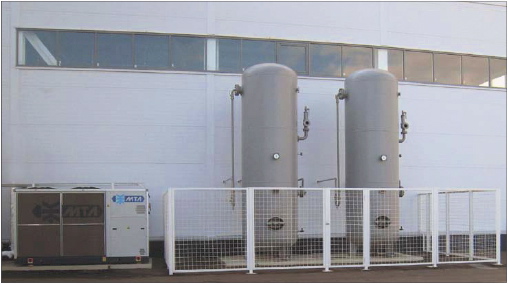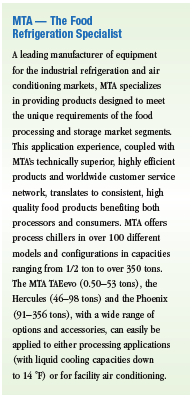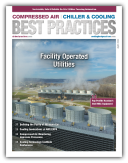Excellent wine depends on excellent process temperature control
Certainly, the production of wine is a complicated mixture of art and science. Color, flavor and aroma – characteristics that define a quality wine – rely as much on the technical expertise and experience of the winemaker as on the grapes themselves. Precise process temperature control is one of the most critical technical requirements of modern winemaking. It allows high volume production while ensuring that the unique character of the final product is consistently attained. Temperature control is also an important factor in the preservation of wine to insure the consistent quality required to allow worldwide distribution in today’s global market.

Pre-fermentation process cooling
During a process called crio-maceration the grape musts (freshly pressed grapes still containing solids - pulp, skins, stems, and seeds) are cooled to a temperature of 40°F in stainless steel tube-in-tube heat exchangers. The time and the temperature at which this process takes place greatly determine the characteristics of the finished product.
Cooling is also required for the clarification process. This pre-fermentation process involves static separation of the musts at a temperature of 50°F - 58°F to remove suspended impurities.
Cooling required during the fermentation process
Temperature control of the musts during the fermentation process is required for the production of high quality wines. Alcoholic fermentation is the chemical reaction in which yeast is used to transform the natural sugars of the fruit into alcohol. The heat generated by this exothermic reaction has to be managed. If must temperatures are allowed to reach the 85°F to 105°F range the reaction will be stopped. This results in high sugar content and an unstable product that requires the addition of sulphur dioxide (SO2) to allow it to be stored without spoiling. In general, optimal fermentation temperatures are 65°F - 68°F for white wines and 77°F for red wines.
Although fermentation tanks are generally cooled, certain system features may require heating as well. In these cases MTA’s HAEevo – the heat pump version of the TAEevo chiller - is available to meet this requirement. The HAEevo is available with stainless steel casing panels making them more hygienic and increasing overall durability.
For example, in Australia (just one of the countries where MTA is a leading wine market supplier) a winery with an annual production of 500 tons uses a MTA Model TAEevo301 to manage the 18 Tons of cooling associated with the fermenting process. The chiller’s on-board storage tank maintains a 90 gallon supply of chilled water at 41°F from which it is pumped through heat exchangers immersed in the fermentation tanks (or in some cases, through tank jackets). The large volume of the chiller’s storage tank provides a thermal mass which compensates for sudden changes in cooling load to provide constant chilled water temperatures regardless of external conditions. A unique feature of the TAEevo chiller is the extended surface evaporator located inside the storage tank which provides high cooling efficiency and low resistance to water flow. This minimizes the electric energy costs associated both with the refrigeration compressor and the chilled water circulating pump.
The wine is taken down to a temperature much lower than it would ever be exposed to thereby preventing the formation of crystals after bottling.

 Malolactic fermentation
Malolactic fermentation
Malic acid occurs naturally in wine and provides a tart, apple taste. For the wine to have a more delicate taste, malolactic fermentation is employed by adding lactic acid bacteria to the wine to convert the malic acid to the softer-tasting lactic acid. This is often used for barrel-aged (oaked) wines. Sometimes malolactic fermentation can occur unintentionally after bottling resulting in a slightly carbonated, bad tasting wine. This can be avoided by raising the wine temperature to about 77°F. Either a HAEevo heat pump or a TAEevo chiller that is equipped with condenser heat recovery can provide the heat required for this process.
Cold stabilization
At low temperatures, potassium bitartrate, a natural component of the wine will appear as sediment in the bottle. To avoid this situation the wine is chilled to about 27°F for a period of up to 24 hours prior to bottling. This process, called cold stabilization, causes the potassium bitartrate to precipitate out of the wine where it can be filtered out. For the example of the Australian winery, cold stabilization is achieved with (4) TAEevo121 chillers that chill brine to about 19°F. This brine is then circulated to the wine tanks to maintain the proper temperature. Precise temperature control and accessibility Wine making is delicate business. Each phase of the process requires controlled conditions to achieve optimum quality. The winemaker must have complete control of process temperatures and be informed of any problems. Each model of the MTA TAEevo line of process chillers includes a user friendly electronic controller that provides digital temperature indication, easy parameter adjustment and enunciates over twenty individual alarms to provide instant troubleshooting. Remote monitoring and control is also available with a RS485-based supervisor system or the TAEevo can be equipped with a technologically advanced server card that can communicate with any PC-client anywhere in the world. This web-based server transmits performance data and allows remote operation via a web browser interface.
Conclusion
TAEevo provides the winemaker with an efficient tool to optimize the temperature control portion of the winemaking process. And with many years of experience and long-tested reliability, this industry is just one of the many food and beverage applications where MTA offers the right refrigeration products to insure the quality of the finished product. So, the next time that you carefully select the perfect wine for your evening, maybe it is worth asking the waiter which chiller was used in its creation.
For more information please contact John Medeiros, MTA-USA, tel: 716-693-8651, email: jmedeiros@mta-usa.com, www.mta-usa.com




